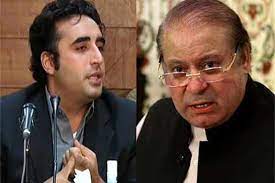By Arun Kumar Shrivastav
The Pakistani National Assembly passed a resolution on Saturday declaring a resolution demanding a delay in the February 8 general elections as undemocratic and unconstitutional. The new resolution calls for the elections to be held on time. The resolution was passed after an independent Senate Member, Dilawar Khan, presented a resolution in the Senate on Friday demanding that the elections be held after February 8 due to the severe cold and security reasons in February. The resolution was accepted in the Senate in the presence of 14 members.
Jamaat-e-Islamic leader Mushtaq Ahmad Khan presented the new resolution in the Senate Secretariat. The resolution calls for the elections to be held on time by the constitution. This resolution effectively averts the crisis looming over the February 8 general elections. The opposition parties in Pakistan had vehemently opposed the proposal to postpone the February 8 general elections. They argued that the elections should be held on time as scheduled. The Election Commission did not take any decision on the proposal, which led to speculation about the future of the elections.
In the meantime, the Pakistan People’s Party (PPP) issued a statement saying that it was open to forming an alliance with other parties ahead of the elections. This included the possibility of an alliance with the Pakistan Tehreek-e-Insaf (PTI) of former Prime Minister Imran Khan. This statement comes at a time when former Prime Minister Nawaz Sharif has recently returned to Pakistan after living in exile for four years. It is unclear whether the PPP and PTI will be able to form an alliance, but it is a sign that the opposition is looking for ways to unite in order to defeat the ruling government in the upcoming elections.
Imran Khan, the former Prime Minister of Pakistan, is facing a number of challenges. He has been in jail since August 2023 on charges of corruption. The Election Commission has cancelled his party’s election symbol, the bat, for being unconstitutional. In addition, his nomination for the upcoming elections has also been rejected. Despite these challenges, Imran Khan remains popular among the Pakistani people. He has been a vocal critic of the previous Shahbaz Sharif-led government.
The return of former Prime Minister Nawaz Sharif to Pakistan after four years in exile has had a significant impact on the country’s political landscape. In a landmark decision, Pakistan’s Supreme Court cleared the path for former Prime Minister Nawaz Sharif to seek a fourth term in office on Monday by overturning a lifetime ban on politicians with convictions. The ruling also paves the way for other convicted politicians to contest in the upcoming February 8 elections but under a reduced five-year disqualification period. Sharif, banned from contesting elections for life, has filed his nomination for the upcoming elections. Sharif’s return has also been met with mixed reactions from the military.
Some analysts believe the military is concerned about Sharif’s return and potential to destabilize the country. Others believe that the military is willing to work with Sharif in order to ensure a smooth transition of power.
The Election Commission’s decision to approve Sharif’s nomination is seen as a sign of the military’s willingness to work with him. The decision has also been met with criticism from some quarters, who argue that it is unfair to allow Sharif to contest elections while Imran Khan is banned. It remains to be seen whether Sharif will be able to return to power in the upcoming elections. However, his return has undoubtedly shaken the political landscape in Pakistan and made the upcoming elections more unpredictable.
According to the Pakistani media and public opinion, the Pakistani army is more likely to support Bilawal Bhutto than Nawaz Sharif in the upcoming elections. This is because Bhutto is seen as a more hawkish leader willing to take a tough stance against India. The army has a long history of meddling in Pakistani politics. It has often overthrown elected governments and installed its leaders. The army is also seen as a key player in the Kashmir conflict.
If Bhutto is elected Prime Minister, the army will likely continue to play a vital role in Pakistani politics. Bhutto will likely support the army’s policies on Kashmir and other security issues. (IPA )


